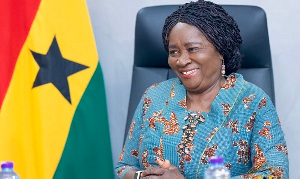General News of Sunday, 20 October 2013
Source: The Herald
Donors Expose Ghana In US$ 6 Million Fake Condoms Dirty
Details of how fake condoms worth US$6 million were procured by the Ministry of Health (MoH) by some procurement officers and in the process making President John Dramani Mahama-backed fight against the control and spread of the deadly HIV/AIDS menace in Ghana, more herculean.
In a report prepared by officials sent from Switzerland by the donors of the cash, the Global Fund (GF) to investigate the US$6 million fake condoms scandal revealed how procurement laws were flouted, how shortages were recorded in the supply of the condoms which were later discovered to be of inferior quality and had holes in them.
Insiders told The Herald that this daylight corruption is what led to the Global Fund refusing to give out money to support Ghana’s fight against AIDS, Tuberculosis and malaria, until the rot is exposed and those officials behind it duly punished by Ghanaian authorities. Shockingly, officials are sleeping over the matter since February, this year.
Most of the condoms called “Be Safe Condoms,” particularly those meant for males, were found to be smaller in size than normal for Ghanaian men, by the investigators.
The international investigators interrogated many users of the condom, including prostitutes, who confirmed the condoms were bursting during sex, fearing they might have contracted the HIV/AIDS virus in the process as the condoms also had “Inadequate lubrication”.
The investigators further discovered that the procurement officers at the Health Ministry, did not buy the condoms from the contracted manufacturers or supplier, but a different company in clear breach of the Global Fund’s procurement rules.
“We noted that even though the contracted supplier was Global Unilink Ventures, the name on the condom boxes was from Harleys Limited based in Nairobi, Kenya. The PR should provide an explanation for the contracted supplier being different from the name of the supplier on the box”, said in their report available to The Herald.
“The signed contract was for the supply of 128 million condoms. However, 130,370,400 condoms were delivered. Out of the number received, 18,900,000, had been issued as at 20 March 2013, leaving a total of 111,470,400 remaining in stock”, the damning report disclosed.
The four PRs are Ministry of Health (MoH), Ghana AIDS Commission (GAC), Adventist Development and Relief Agency (ADRA) and Planned Parenthood Association of Ghana (PPAG).
Another shocking thing about the US$6 million condom purchase was that, the procurement officers had claimed the Ghana’s Food and Drugs Authority (FDA) tested and confirmed the quality of the condoms, but this turned out to be a lie as the same condoms were later seized by the FDA officers, because they did not meet international standards.
The United States Agency for International Development (USAID) Senior HIV/AIDS Advisor in Ghana, Peter Wondergem, is mentioned in the report as having seen the damning document.
The report is entitled “Review of Condoms Procurement Process and Supply Plan”.
It said “Under the Global Fund Hl V R8 Grants, procurement of condoms is undertaken by the Ministry of Health on behalf of the four Principal Recipients implementing the grants. The four PRs are Ministry of Health (MoH), Ghana AIDS Commission (GAC), Adventist Development and Relief Agency (ADRA) and Planned Parenthood Association of Ghana (PPAG). The total budget ofUS$6.04 million for the procurement of condoms was included in the HIV R8 grant being implemented by the MoH. The rationale for this arrangement is two-fold. First, it would be easier for the Ministry of Health, being a public entity; to obtain tax exemptions on procurement than it would be for the other PRs. The second reason was to achieve economies of scale through bulk procurement”.
The Global Fund undertook a review of the last supply plan for condoms to see whether the PR, MoH, was following the supply plan agreed and reviewed the PR procurement of condoms funded by GF, specifically paying attention to the quality of condoms (Male and Female) procured and whether the procurement process (and quality) was in line with GF Policies.
The supply plan for condoms, according to the report was reviewed (based on the work plan and approved HIV Phase 1 budget) to ascertain the quantity of condoms to be procured in Phase 1, as well as the schedule of procurement. The total quantity of condoms that was to be procured and distributed by the PRs was 180 million. This was made up of 178 million male condoms and 2 million female condoms. The condoms were supposed to be procured in quarter 2 of year one (between April and June 2010) for distribution throughout Phase one of implementation.
However, due to the late approval of the PSM Plan, as well as, bureaucracies in the PR’s procurement systems, the first consignment containing 50 million condoms was received in one lot on July 24, 2011. Prior to the receipt of condoms procured with Global Fund resources, the PRs obtained condoms from MoH for distribution to their clients.
The next supply of condoms was made by Harleys Limited based in Nairobi, Kenya, although the PR signed the contract with Global Unilink Ventures.
The signed contract was for the supply of 128 million condoms. However, 130,370,400 condoms were delivered. Out of the amount received, 18,900,000 had been issued as at March 20, 2013, leaving a total Of 111,470,400 remaining in stock.
Review of bidding documents and evaluation report indicated that the “Tendering was undertaken in August 2010, but bid evaluation was undertaken in March 2011”.
It was also “observed that four bidders procured the bidding document and participated in the bidding, but only two bidders effectively qualified for further evaluation.
Although in the evaluation report, it was documented that samples of both proposed suppliers have been tested by FDB as meeting WHO / ISO standards, it is not clear from the documentation submitted as to the source and sites of manufacture. Shockingly
The PR had been experiencing some level of confusion regarding the roles of the Procurement and Supply Division (PSD) of the MoH and the Supplies, Stores and Drug Management Directorate (SSDM) of the Ghana Health Services (GHS) in relation to procurement using Global Fund resources. In an effort to streamline the process and to resolve the confusion, the PR held a meeting on 21 December 2010, attended by key technical staff from the PSD and SSDM to discuss the roles of the PSD and SSDM regarding the procurement of Health Products, Medicines and Pharmaceuticals, and other large capital purchases including vehicles and renovations /refurbishments. The following decisions were taken at the meeting:
All Medicines and Pharmaceutical products (including condoms and insecticide treated nets) purchased with Global Fund support in Ghana, would be procured by the MoH procurement unit and all other Health Products (equipment, reagents and consumables) would be procured by the Ghana Health Service procurement unit.
All renovations and other services would be procured by the GHS per the arrangements above, the condoms should have been procured by PSD of MoH.
However, they were procured by SSDM of GHS. This is because SSDM of GHS had already commenced the process for the procurement of condoms before the arrangements were agreed.
On the quality of condoms procured, it said “There have been reports relating to complaints on the quality of condoms procured with GF resources. The complaints from the field include “Frequent bursting of condoms, inadequate lubrication of condoms and smaller than normal size of some of the condoms”. On storage in the Central Medical Stores, the condoms were not in good conditions with an explanation that there is not enough space in the main warehouse. Additionally, an assessment of the storage conditions at CMS indicated that CMS lacked regular and systematic maintenance. There were signs of leaks in the roof. Also, installed air conditioning was not functional with too high temperature (over 35 C).
The expiry date for the condoms is April 2017.
A letter from the FDA directing the CMS to stop issuing ‘Be safe’ condoms pending the outcome of quality analysis to be undertaken by FDA was seen. The directive is in line with the general provisions of the Public Health Act, 2012, Act 851.
The Ghana Health Service (through the Programme Manager of the National AIDS/STI Control Programme) confirmed that there have been quality concerns relating to frequent bursting as well as the smaller than average size of the condoms, and that the SSDM of Ghana Health Service (the entity that undertook the procurement) had been requested to initiate actions with the manufacturer.
GAC has informed the GF that the quality of condoms has been discussed by the MARP Technical Working Group as well as the oversight committee of the CCM (by SRs of GAC and ADRA) and a report is being compiled and would be shared with MoH, CCM and other stakeholders for further Action.
The Global Fund also demanded further clarifications on the following issues;
The PR should provide the supply plan that they have agreed with the Partners (Not the PSM plan, as the procurement process was so much delayed and had been overtaken by events). This will be helpful to determine if proper planning is in place and in consultation with other relevant parties. It seems that a large number of condoms is currently present in the country procured from the GF resources. The contract was for the supply Of I28 million condoms, but 130,370,400 condoms were delivered. Out of the amount received, 18,900,000 had been issued as at 20 March 2013, leaving a total Of 111,470,400 remaining in stock.
The PR should provide clarifications as to why there was an oversupply -128 Million condoms ordered but 130, 37 0,400 delivered.
Tendering was undertaken in August 2010 but bid evaluation was undertaken in March 2011.The PR has not been able to provide the reason for the significant time lapse and should do so.
PR should provide evidence that the condoms were manufactured from sources meeting the required standards. The specifications must conform to the standards as per WHO/UNFPA guidelines.
“We would like to know who the manufacturer and manufacturing site is, as the suppliers are not the manufactures- i.e. Global Unilink Ventures” since the need to comply with these minimum standards is a requirement under the Global Fund Procurement and Supply Management Policies.
“We noted that even though the contracted supplier was Global UnilinkVentures, the name on the condom boxes was Harleys Limited based in Nairobi, Kenya. The PR should provide an explanation for the contracted supplier being different from the name of the supplier on the box” it observed.
Global Fund also tasked “PR to clarify if pre-shipment inspection and quality control testing was done. If so, provide the results. We have received information that there are complaints regarding the quality of condoms coming from users such as frequent bursting of condoms, inadequate lubrication, and inappropriate size”.
It also demanded from “PR to confirm if there are any tests have been undertaken in a laboratory that can test condoms in line with the ISO standards and others specified by the WHO/UNFPA”.
“The Condoms are stored in conditions not meeting those specified in the UNFPA/WHO guidelines outlined above. The temperatures are extreme C35 degrees centigrade at time of review (above normal room temperature), abnormally stuck to high levels with minimal air circulation. The condoms should be immediately moved and stored in good storage conditions” it insisted.












